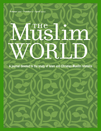
MUSLIM WORLD
Scope & Guideline
Celebrating a Century of Scholarship in Islamic Studies
Introduction
Aims and Scopes
- Islamic Theology and Philosophy:
The journal frequently publishes research on Islamic theology, exploring core concepts such as Maqasid al-Aqida and the philosophical underpinnings of Islamic thought, providing insights into both classical and contemporary interpretations. - Political and Social Dynamics in the Muslim World:
A significant focus is placed on the political landscape within Muslim-majority countries, analyzing governance, political philosophy, and socio-political movements, particularly in the context of current events and historical developments. - Cultural Interactions and Community Building:
The journal highlights the interactions between Muslim communities and other cultural or religious groups, emphasizing collaborative efforts, community building, and shared experiences, especially in multicultural settings. - Islam and Modernity:
Research on the intersections of Islam with modernity, including topics such as technology, science, and social change, is prevalent, reflecting the journal's commitment to addressing contemporary challenges faced by Muslim societies. - Historical Studies and Heritage:
The journal also emphasizes historical analysis, including the study of heritage, manuscript traditions, and the historical evolution of Islamic thought, thus contributing to a richer understanding of the Muslim past.
Trending and Emerging
- Contemporary Islamic Ethics and Social Issues:
There is an increasing emphasis on contemporary ethical issues within Islamic contexts, such as environmentalism, women's rights, and social justice, reflecting a growing concern for applying Islamic principles to modern societal challenges. - Interfaith Relations and Community Dynamics:
Recent publications show a notable trend towards exploring Muslim-Christian relations and broader interfaith dialogues, highlighting the importance of community building and mutual understanding in diverse societies. - Impact of Technology and Media on Islamic Thought:
The influence of digital media, social networks, and technology on Islamic discourse is an emerging area of focus, examining how these platforms shape religious expression and community engagement. - Gender Studies and Female Agency in Islam:
Research on the roles and representations of women within Islamic contexts is gaining prominence, with a focus on female religious authority, agency, and the impact of socio-cultural transformations.
Declining or Waning
- Traditionalist Perspectives:
Themes centered around staunch traditionalist viewpoints, including some aspects of Islamic jurisprudence and strict adherence to classical interpretations, have seen a decline as contemporary discourses increasingly favor more progressive or reformist approaches. - Sectarian Studies:
Research that focuses heavily on sectarian divides within Islam appears to be waning, possibly due to a growing emphasis on unity and interfaith dialogue in the context of contemporary challenges. - Historical Narratives of Conflict:
While historical studies remain a key area, there seems to be a reduction in publications that solely focus on conflict narratives, with a shift toward more constructive themes of cooperation and coexistence.
Similar Journals

Miscelanea de Estudios Arabes y Hebraicos-Seccion Arabe-Islam
Elevating Research in Arabic and Hebrew InteractionsMiscelanea de Estudios Arabes y Hebraicos-Seccion Arabe-Islam is a distinguished academic journal dedicated to the study of Arabic and Islamic studies, published by UNIV GRANADA, EDITORIAL. With an ISSN of 1696-5868 and E-ISSN 2341-0906, this publication provides a vital platform for scholars and researchers interested in the deep historical, cultural, and linguistic connections between the Arab and Hebrew worlds. Situated in the heart of Granada, Spain, this journal aims to promote interdisciplinary approaches and foster dialogue among academics in these rich fields of study. Although it operates under traditional access protocols, the journal’s commitment to quality is reflected in its rigorous peer-review process, making it a valuable resource for researchers, professionals, and students alike. By engaging with cutting-edge research and critical perspectives, the journal plays an essential role in enhancing the understanding of Arabic and Islamic heritage today.
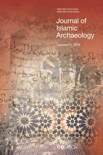
Journal of Islamic Archaeology
Fostering Dialogue on Islamic Archaeological DiscoveriesJournal of Islamic Archaeology is a distinguished publication dedicated to advancing the field of archaeology through the lens of Islamic heritage and culture. Published by EQUINOX PUBLISHING LTD, this journal provides a platform for researchers, professionals, and students to disseminate their findings and engage in critical dialogue regarding the archaeological aspects of Islamic societies from 2014 to the present. With an ISSN of 2051-9710 and E-ISSN 2051-9729, the journal is indexed within significant academic databases and positioned notably in the Q3 and Q2 quartiles for archaeology in the Arts and Humanities and Social Sciences categories, respectively. The journal fosters scholarly exchange and innovation, drawing attention to the rich tapestry of Islamic archaeology, and securing its role as an essential resource for practitioners and academics alike. Its commitment to rigorous peer-review and high-quality contributions ensures a valuable repository of knowledge, enhancing the understanding of an often underrepresented field in archaeology.

Nazariyat-Journal for the History of Islamic Philosophy and Sciences
Bridging History and Contemporary ThoughtNazariyat-Journal for the History of Islamic Philosophy and Sciences, published by SCIENTIFIC STUDIES ASSOCIATION, is a leading academic journal dedicated to the exploration and dissemination of research in the history of Islamic philosophy and sciences. With an ISSN of 2528-8563 and E-ISSN 2547-9415, this journal has adopted an Open Access model since 2014, ensuring that valuable insights and scholarly work are readily available to a global audience. Situated in Istanbul, Turkiye, the journal serves as a vital platform for researchers, students, and professionals seeking to deepen their understanding of the rich intellectual traditions of Islamic thought. Although the HIndex is currently unavailable, the journal is committed to upholding rigorous academic standards while encouraging interdisciplinary dialogue. By bridging historical examination with contemporary relevance, Nazariyat plays an essential role in fostering a nuanced appreciation of Islamic intellectual heritage within the broader scientific community.
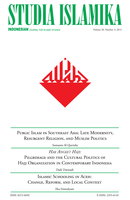
Studia Islamika
Pioneering research in the realm of Islamic studies.Studia Islamika is a distinguished academic journal published by the Syarif Hidayatullah State Islamic University Jakarta, specifically through the Center for Study Islamic & Society. Established in 1994, this journal has rapidly evolved to become a pivotal platform for advancing scholarly dialogue in the field of Islamic Studies. With a notable impact factor and categorized in the prestigious Q2 quartile of Religious Studies as of 2023, it emphasizes the critical examination of Islamic thought, culture, and sociopolitical contexts. The journal's issues span from 1994 to present, featuring innovative research that engages with contemporary challenges in Muslim societies. Although it does not currently offer open access, its rigorous peer-review process ensures high-quality research contributions. Researchers, professionals, and students alike will find Studia Islamika to be an invaluable resource for enhancing their understanding of the multifaceted dynamics within Islamic traditions and their implications in today's world.
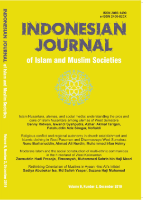
Indonesian Journal of Islam and Muslim Societies
Bridging academic research with contemporary Islamic dialogue.Indonesian Journal of Islam and Muslim Societies (IJIMS) is a leading platform for scholarly discourse in the fields of Islamic studies and social sciences, published by INST AGAMA ISLAM NEGERI-IAIN SALATIGA. Since its establishment in 2011, IJIMS has been dedicated to advancing the understanding of Islamic culture, society, and politics, with an impressive impact reflected in its Q1 ranking in Religious Studies and Q2 in Sociology and Political Science as of 2023. The journal not only ranks among the top in the Scopus database, occupying the 19th position in the Arts and Humanities—Religious Studies category, but it also offers open access to its content, making it readily available to a global audience. This commitment to accessibility ensures that researchers, students, and professionals can engage with high-quality research that informs and shapes contemporary dialogue on Islam and Muslim societies. With a convergence of rich academic contributions through to 2024, IJIMS stands as a vital resource for those looking to explore the complexities of Islam in a modern context.
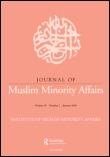
Journal of Muslim Minority Affairs
Unpacking the Complexities of Cultural IdentityJournal of Muslim Minority Affairs, published by Routledge Journals, Taylor & Francis Ltd, stands as a pivotal platform in the realm of interdisciplinary research focusing on Muslim minority communities worldwide. With an ISSN of 1360-2004 and an E-ISSN of 1469-9591, this journal aims to explore critical issues of identity, cultural integration, and socio-political dynamics affecting these communities. It boasts a commendable impact factor and is strategically positioned within various academic quartiles: Q3 in Anthropology and Sociology and Political Science, alongside Q2 in Cultural Studies, demonstrating its comprehensive engagement in these fields. Researchers and practitioners can access a wealth of qualitative and quantitative studies, enhancing understanding and awareness of minority rights, cultural expressions, and political representation. With historical convergence from 1996 and a breadth of subjects relevant to today’s global discussions, the Journal of Muslim Minority Affairs is essential for scholars, professionals, and students interested in the complexities surrounding Muslim minorities.

Al-Shajarah
Advancing Scholarly Dialogue in Cultural and Religious StudiesAl-Shajarah is an esteemed academic journal that serves as a vital platform for scholarly discourse in the fields of Cultural Studies, History, Philosophy, and Religious Studies. Published by the International Islamic University Malaysia and the International Institute of Islamic Thought and Civilization, the journal reflects a profound commitment to advancing understanding and dialogue surrounding Islamic thought and its place in modern society. With an ISSN of 1394-6870 and an evolving publication history since its convergence in 2011, Al-Shajarah offers valuable insights that cater to a broad array of readers, from seasoned researchers to emerging academics. The journal's rigorous peer-review process and commitment to cultural and religious scholarship are underscored by its categorization in the Q3 and Q4 quartiles in critical academic fields, and its Scopus rankings demonstrate its relevance within the global academic landscape. While open access is not currently available, Al-Shajarah remains a crucial resource for those seeking to enrich their understanding of Islamic civilizations and philosophy, providing access to pioneering research that shapes the conversation within these disciplines.
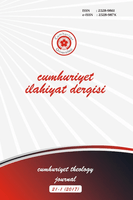
Cumhuriyet Ilahiyat Dergisi-Cumhuriyet Theology Journal
Amplifying Scholarly Voices Across Disciplines.Cumhuriyet Ilahiyat Dergisi-Cumhuriyet Theology Journal is a distinguished peer-reviewed publication under the auspices of Cumhuriyet University, Faculty of Theology, based in Turkey. With an ISSN of 2528-9861 and an E-ISSN of 2528-987X, this open-access journal has been committed to advancing the scholarly discourse in the fields of Philosophy and Religious Studies since its inception in 2016. As part of a rapidly evolving academic landscape, the journal has achieved notable rankings, including Q3 in both Philosophy and Religious Studies, and Q4 in Social Sciences (miscellaneous) for 2023, indicating a growing impact in these disciplines. The journal aims to foster innovative research and critical dialogue, making it an essential resource for researchers, professionals, and students alike. With open access options, it ensures a wide dissemination of knowledge, amplifying the voices of scholars from diverse backgrounds and contributing significantly to the global academic community.

Islamic Africa
Advancing Understanding of Islam's Role in African SocietyIslamic Africa, published by BRILL, is a vital academic journal that serves as a scholarly platform dedicated to the exploration of Islamic culture and its multifaceted interactions with the African continent. With a focus on cultural studies, history, literature and literary theory, religious studies, and the social sciences, this journal invites contributions that deepen our understanding of the historical and contemporary dynamics of Islam in Africa. Although categorized in various quartiles, it holds significance as a resource for researchers and students, particularly those engaged in areas ranked within the Q3 and Q4 categories. Since its inception, Islamic Africa has evolved through converged years, actively promoting interdisciplinary dialogue among scholars. With its commitment to high-quality research, this journal aims to illuminate the complexities of Islamic traditions and societies in Africa, fostering a deeper appreciation of their contributions to global cultural heritage.

Oriens
Navigating the Complexities of Culture and BeliefOriens is a distinguished academic journal published by BRILL, based in the Netherlands, focusing on the interdisciplinary integration of Cultural Studies, Philosophy, and Religious Studies. With an ISSN of 0078-6527 and E-ISSN of 1877-8372, it has established its presence since 2009 and continues to provide a vital platform for scholarly discourse through 2024. Recognized in the Q3 quartile for all three fields, the journal boasts impressive Scopus ranking positions, such as 75th out of 644 in Religious Studies, placing it in the top 12% percentile of its category. This makes Oriens an invaluable resource for researchers, professionals, and students seeking to explore significant themes and developments in these areas. While the journal is not open access, its subscription model ensures high-quality, peer-reviewed content that contributes significantly to the existing body of knowledge. By fostering a critical dialogue among diverse scholarly perspectives, Oriens remains an important conduit for advancing interdisciplinary insights and cultural understanding.